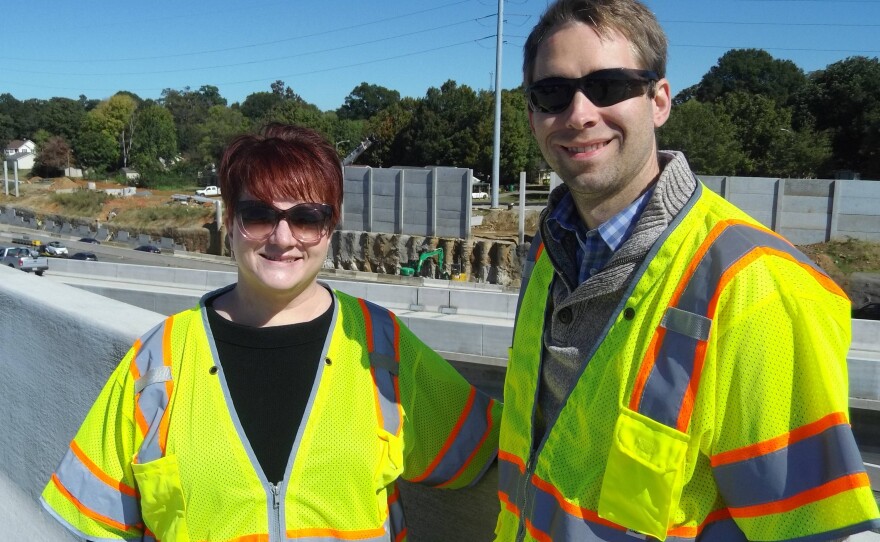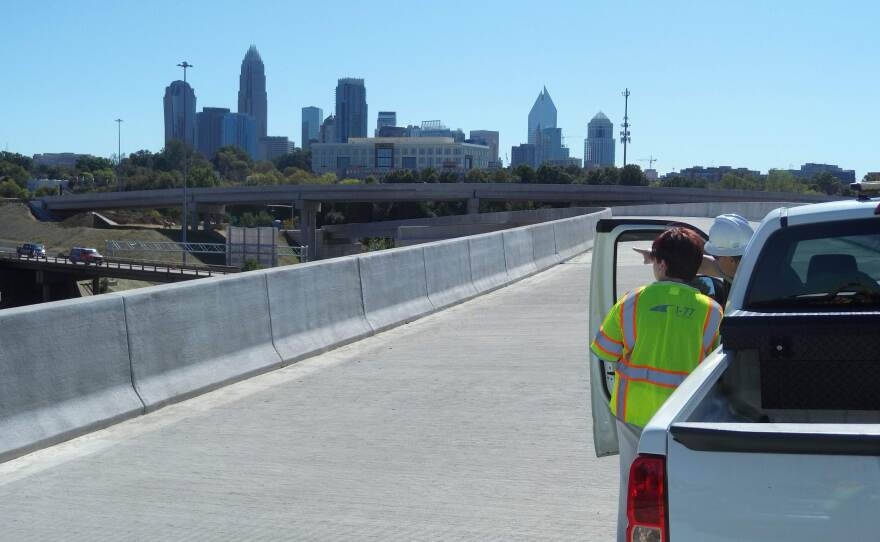The Interstate 77 Express Lanes have been under construction for four years north of Charlotte. The toll lanes are now open on all 26 miles between Interstate 277 and Exit 36 in Mooresville, and drivers have all kinds of questions about how they work.
This week's "FAQ City" started with a question from an anonymous listener who wanted to know: "Just exactly how do the new express lanes work? Who is obligated to pay?"
That prompted us to ask "FAQ City" listeners what other questions they had about the I-77 Express lanes. And we got a highway truckload - everything from "Can I use my EZ-Pass from another state?" to "What happens if I don't pay?"
We have answers. But first, a little background.
Road planners here in Charlotte first started talking about toll lanes 10 years ago, when the commute from the Lake Norman area to Charlotte was getting longer and longer. The road needed to be widened, but the state said there wasn't enough money to do the job. So in 2014, the North Carolina Department of Transportation signed a contract with a private company to finance, build and manage the lanes for 50 years.
That's been controversial. Local officials, citizens and businesses in the Lake Norman area have protested the contract and pushed to terminate or change it. As it stands, NCDOT has pledged to consider changes. The Charlotte Regional Transportation Planning Organization has approved the idea of using the highway shoulders between exits at rush hour. But that still has a long way to go.
But other than that, it looks like the lanes are here to stay. Tolls pay for construction and they help manage traffic in the lanes.
The idea is to guarantee a reliable ride. Right now tolls are fixed. But eventually they'll rise with more traffic in the lanes. That will limit the number of drivers willing to pay to use them, and keep traffic flowing in the toll lanes.
And by the way, you don't have to pay for them - it's free if you have three or more people in the car and a transponder switched to the high occupancy vehicle setting - for high occupancy vehicle. Commuter buses can use the lanes free and so can motorcycles. Big trucks are banned.
One of the most common questions is can you use the lanes without a transponder? Yes, said Jean Leier, a spokeswoman for I-77 Mobility Partners, which built and manages the lanes.
"If you're not sure if you're going to be a frequent user, you can go out and give them a try. And when you enter into the express lanes, it'll take a picture of your license plate. And so that picture of your license plate then gets sent to the North Carolina Turnpike Authority, who operates the NC Quick Pass program. And then they in turn will send you a bill for your usage," Leier said.
But, she added, they "highly recommend" getting a transponder, which is an electronic device or sticker you mount on your windshield. They're available through NCQuickPass.com or at an NCQuickPass store, such as the one on Harris Boulevard off Interstate 485.

With a transponder, Leier said, "you just drive through, it's seamless. You open up an account with NC Quick Pass, and that gets billed directly to your account. And all you have to do is look at your monthly statement and keep that card in good standing. And you really don't have to worry about the thing."
Lots of people wondered if they can use their toll devices from another state. You should be able to.
The North Carolina Turnpike Authority has agreements with EZ Pass from the Northeast, the Georgia Peach Pass and Florida Sunpass. And likewise, you can use your NC Quick Pass in many other states.
As for pricing, you can look up the toll rates on I77Express.com. There's a fixed rate for each of 11 segments that varies with the time of day. So, for example, a weekday rush-hour trip between Charlotte and Mooresville will currently run you about $6.50.
But beginning Dec. 1, toll rates will begin to fluctuate with the amount of traffic in the lanes. That's called dynamic pricing, and it's designed to keep traffic flowing at a minimum speed - 48-56 miles per hour. If so many cars use the lanes that speeds begin to slow down, the price will go up.
Many people wanted to know how the toll-lane rules are enforced, such as speeding, no trucks with more than two axles, and using the transponder to ride free with three or more people. They're enforced by State Highway Patrol officers on overtime paid by I-77 Mobility Partners, according to Trooper Ray Pierce.
Since the northern section of the road opened June, troopers have been issuing about 25 citations a week - about half for speeding. And that includes a few drivers who were going 95 miles an hour or faster. So, speed has been an issue in the new lanes.
The other major concern, especially for the toll company, is when drivers try to get a free ride by setting their transponders in HOV mode, signaling at least three people. Troopers are watching that, with the help of the toll-lane technology, according to Pierce.
"There are gantries at several locations on the toll road. And if a vehicle comes under that gantry and it is claiming to be an HOV subject or vehicle, then a red light will come on over that vehicle as they proceed under that gantry," Pierce said.
Troopers park near the gantries and can see when the red light comes on. If they don't see at least three people in your car, they'll stop you and issue a warning. For now, that's all it is — a warning. Pierce said the law was written 15 years ago with two-person HOV lanes in mind, not the three now being used. He said legislation is needed before they can issue citations, which come with a $100 fine.
"So, until that comes full circle and some of the general statutes change over to apply to these, then we're only doing basically written warnings and verbal warnings," he said.
And what if you don't pay your bill? The N.C. Turnpike Authority, which collects the tolls, will come after you, and it will cost you. There's a $6 penalty after 30 days. They add another $25 after 60 days. And if you still haven't paid it after 90 days, the turnpike authority can put a hold on your registration.
Do you have a question about Charlotte's people, culture or history? Let us know! Submit your question in the box below, and we may be in touch.
_
While you're at it, make sure to subscribe and rate/review the podcast on Apple Podcasts, NPR One, and Google Play.




